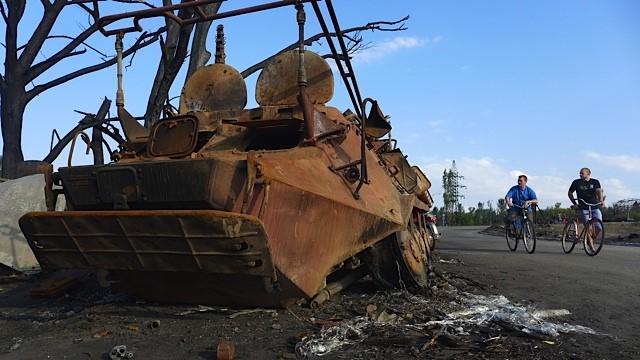Ukraine's Poroshenko looks for breathing space in truce
- Published
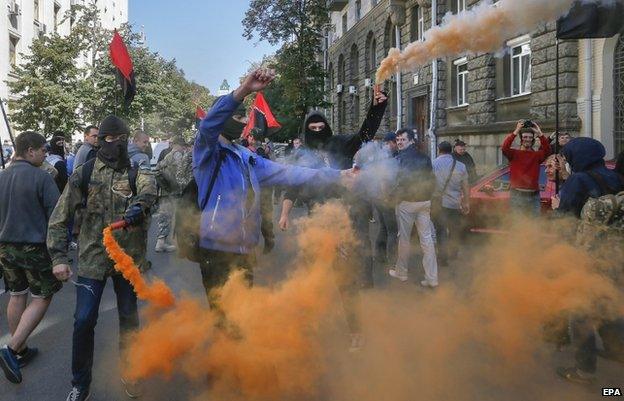
Nationalists objected after parliament passed a law giving limited self-rule to eastern Ukraine regions
All politics is a quest to select the lesser of two evils. Ukraine's President, Petro Poroshenko, however, is perhaps faced with some of the worst options of any world leader in recent memory.
Most of the time, he seems to be confronted with a choice between watching his country being destroyed right now, or later, through a drawn-out process.
But there are very rare glimmers of hope, when it appears Ukraine may indeed scrape by and continue to exist as a viable, unified state.
These glimmers have probably shone most brightly recently. Two weeks ago, Kiev declared a ceasefire and set out a general peace plan with pro-Russian forces in eastern Ukraine.
The truce is very tenuous: heavy fighting still rages around Donetsk, and combatants and civilians continue to die.
Still, it is an improvement on the massive bloodletting that preceded it, and it stopped the relentless advance of the Russian-backed separatists and, by all evidence, Russian forces among them.
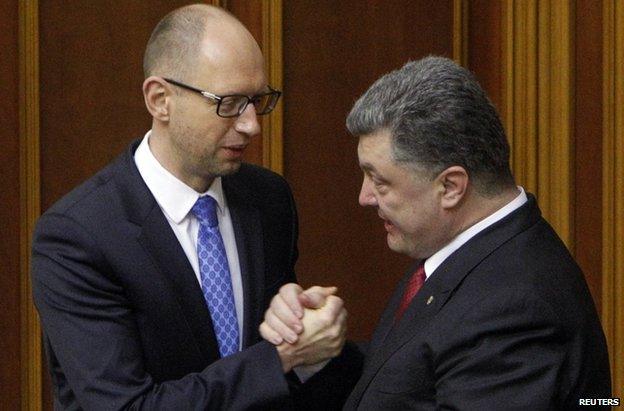
President Petro Poroshenko (R) with Ukrainian PM Arseniy Yatseniuk after parliament ratified the EU deal
Crucially, it gives Mr Poroshenko breathing space to hold snap parliamentary elections in October and address the country's rapidly disintegrating economy.
GDP could shrink by 10% this year, and the country is bracing itself for a bitter winter minus gas supplies from Russia.
Meanwhile, the public is clamouring for the reforms and anti-corruption measures promised after the February revolution.
This week, Ukraine's parliament approved two pieces of legislation that may in the end also help stabilise and transform the country
A law granting limited self-rule and amnesty to the militants
The ratification of a crucial free trade and political treaty with the European Union
The law for the insurgents treads a very fine line of recognising the futility, at least for the moment, of bringing the rebel-dominated areas back under Kiev's control, while denying them the full independence they desire.
The EU-Ukraine Association Agreement locks Ukraine into European structures and sets out a programme to reform Ukraine politically and economically, rooting out corruption and establishing an EU-based rule of law.
'Fifty questions'
These steps unleashed a barrage of criticism, though. Ukraine's former prime minister and now opposition leader, Yulia Tymoshenko, said the deal legitimised Russia's rule over eastern Ukraine.
Serhiy Taruta, the governor of the eastern Donetsk region, which partially falls under rebel control, said the area's inhabitants would feel "raped" if the law came into effect.
"Where are we - in Ukraine or Russia? What did we fight for? What did our guys die for?" he asked.
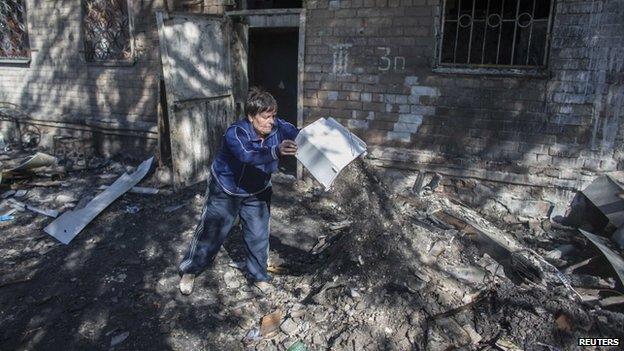
Heavy fighting continues to rage in and around Donetsk but there have been fewer casualties
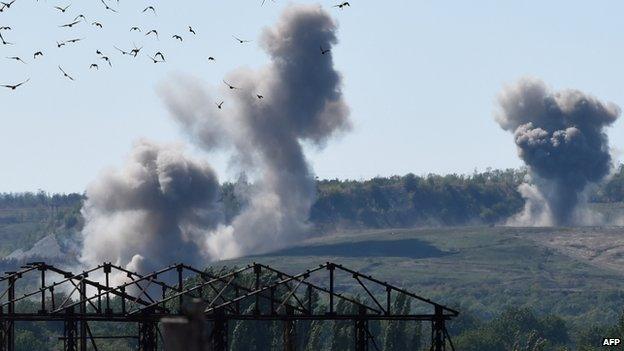
The idea of self-rule for the rebels risks creating a frozen conflict in the east
For many, granting the militants self-rule, albeit in a limited form, also risks creating a "frozen conflict" in eastern Ukraine, comparable to similar situations in Moldova, Azerbaijan and Georgia.
This, they say, would provide Moscow with a permanent means to influence Kiev, if not threaten it outright.
Objections to the Association Agreement centred on a decision, announced just three days before the ratification, to delay implementing the treaty in full until the end of next year.
In Kiev and Brussels, officials spun the postponement as a victory over Russian pressure. They said Moscow wanted the agreement to be rewritten entirely, which they had avoided through a compromise.
What's more, most of the treaty will go into effect - including key provisions on reform and modernisation.
The EU will also be open to Ukrainian goods, while Kiev did not have to drop its own tariffs, which will provide a needed boost to Ukraine's teetering economy.
Still, the overriding fear is, now that the Kremlin has interjected itself into what was a bilateral treaty between Kiev and Brussels, that it will make further demands - or try to kill the agreement altogether.
Ukraine's Deputy Foreign Minister, Danylo Lubkivsky, resigned in protest over the treaty's delay, saying it the sent "the wrong signal to everybody: to the aggressor [Russia], to our allies, and, most importantly, to the citizens of Ukraine".
"You can't postpone a choice. If you do, it's no longer a choice," he added.
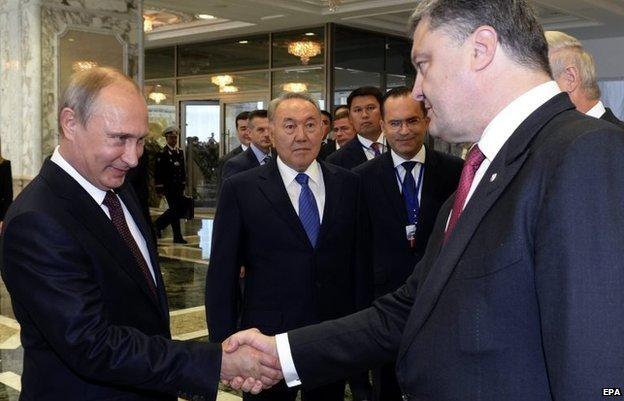
Hope persists that President Putin may change course in his attitude towards Ukraine
Russia's goals
The debate in Ukraine boils down to this:
Are the latest compromises deft moves which are camouflaged as major concessions, but will ultimately preserve Ukraine?
Or are they just the opposite - capitulations that will lead to defeat?
But the answer to this question lies with one man, Russian President Vladimir Putin.
No-one, however, can say what Russia's goals ultimately are in Ukraine. The Kremlin has sent ambiguous and sometimes contradictory signals, leaving politicians and commentators squabbling over what's driving Mr Putin.
Arguments have ranged from fears of Nato expansion, to objections over the EU-Ukraine free trade agreement, to defending the rights of Russian-speaking populations abroad, to opposing democratic processes in Ukraine, to wanting to establish a sphere of influence and dictating policy to Europe.
And this is an incomplete list.
Moscow's credibility crisis
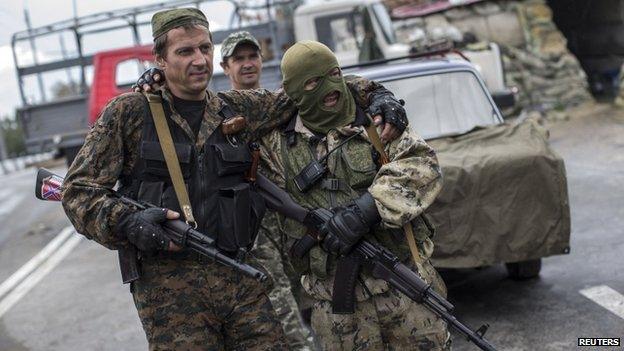
Growing evidence suggests that pro-Russian rebels (above) have been joined by Russian troops
And all this is complicated even further by the conviction among many that Mr Putin has dissembled from the very beginning.
At an international conference in Kiev this week, European Commission Jose Manuel Barroso bluntly said Russia officials had "lied" when they claimed the EU didn't discuss the Association Agreement with them last year.
In addition, Moscow sent its forces into Crimea, denying it at first but admitting it later. This was done in violation of agreements Moscow had signed, and, experts and Western officials say, under a flimsy excuse of protecting the local population.
Now an ever-expanding body of evidence points firmly to the fact that Russian troops have invaded Ukraine for a second time, although Kremlin officials again deny this is happening.
As a result, Moscow suffers a credibility crisis, to put it lightly.
Many Ukrainian government and Western officials doubt Mr Putin's trustworthiness to hold to future agreements - and assume the worst in his intentions in Ukraine and abroad.
"It seems very much to us that Vladimir Putin wants to return to the situation before November last year," said one senior Ukrainian official, speaking off the record. "That is, Ukraine moving towards Europe only on paper, and increasingly under Russian control.
"He has told us that he will go to any length to achieve this, and destroy the country if necessary."
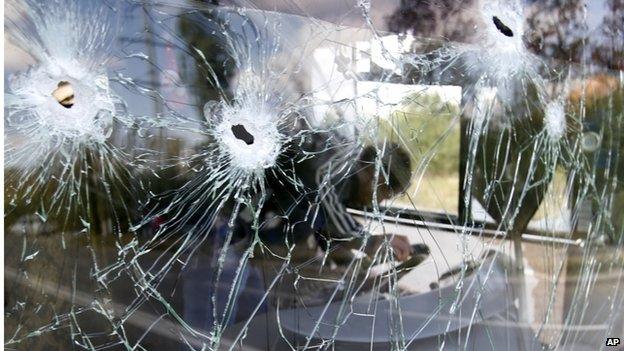
Although the ceasefire is holding, a woman was killed when a bus was hit by a shell in Donetsk on Tuesday
Given that, many in Kiev feel that any calls for "compromise" with Russia are a fool's errand. How can you compromise when one side's end goal is subjugation?
At the same time, a hope persists that cooler heads could prevail in the Kremlin and convince Mr Putin to change course.
But all these discussions would become immediately moot if the ceasefire breaks down, which some officials feel is foregone conclusion. Ukraine will never submit to the level of control that Russia desires, they say. At the very least, the country needs a pause in hostilities to prepare itself.
"Everything right now is about buying time," said the official. "That's what's most important right now."
- Published18 September 2014
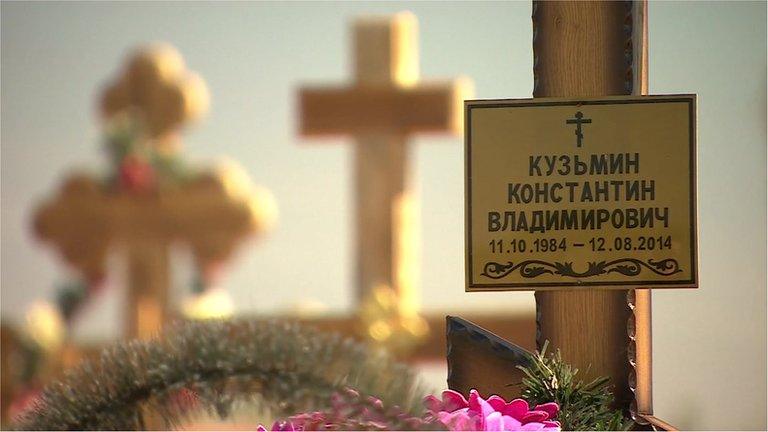
- Published18 February 2015
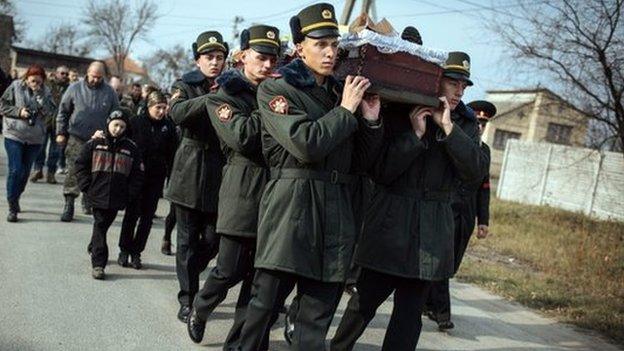
- Published17 September 2014
